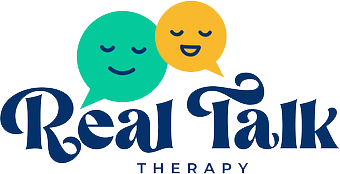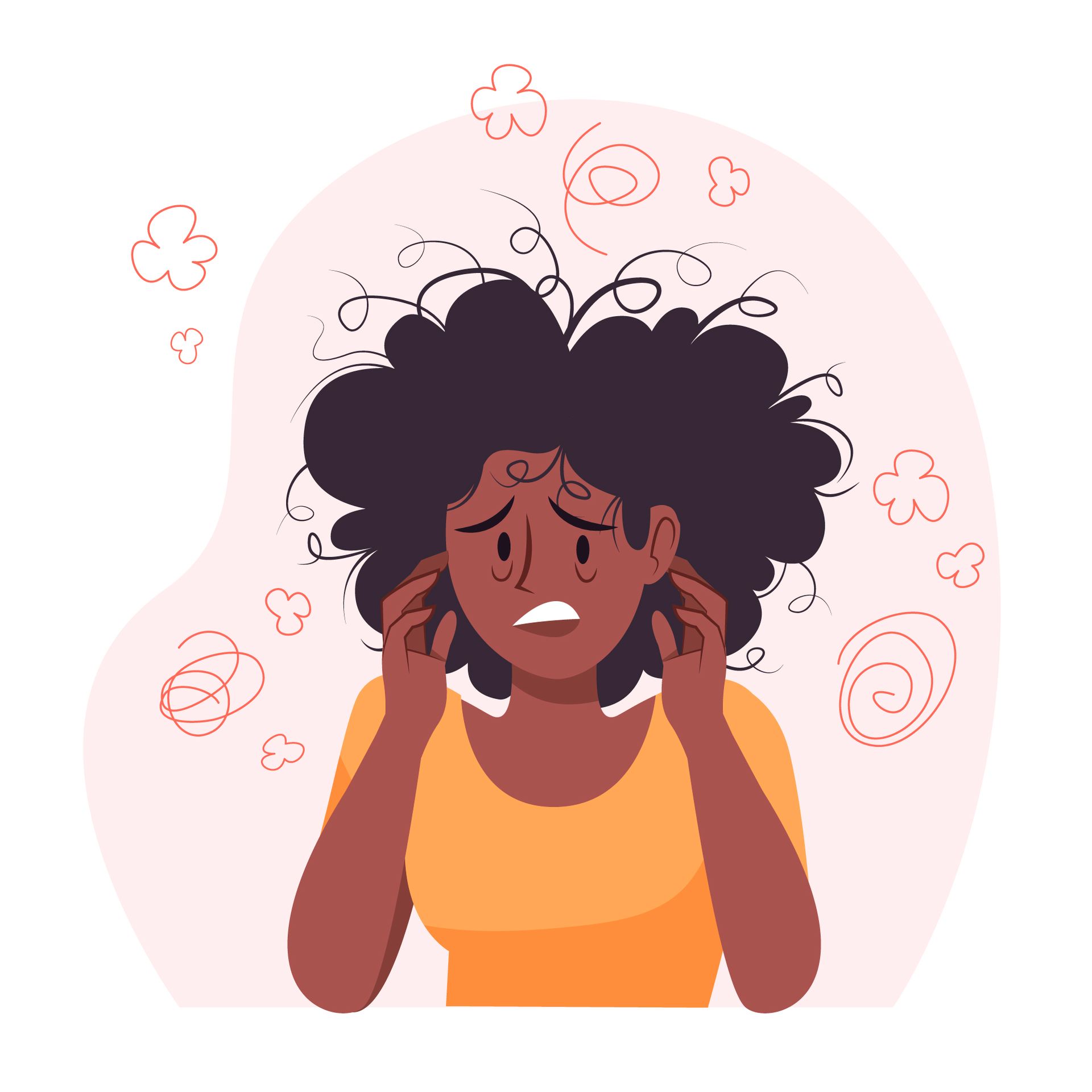Why Boundaries Feel So Hard (Especially If You Grew Up in Chaos) | Real Talk Therapy Corning NY

Introduction
You know you need boundaries. Everyone talks about them. But every time you try to set a boundary, it feels like you're doing something terrible. Your stomach churns. You feel guilty. You wonder if you're being a bad person.
If you grew up in chaos, boundaries might feel foreign or even dangerous. Maybe your family didn't respect boundaries, or maybe the concept of boundaries was completely non-existent in your home. You might have learned that keeping the peace was more important than protecting your own needs.
At Real Talk Therapy in Corning, NY, I understand why boundary-setting feels so overwhelming when you've never been taught how to do it. As someone who has walked this path myself, I know the fear that comes with trying to protect your sanity while still caring about others.
Article Outline
- Why chaos makes boundaries feel impossible
- What happens when you grow up without healthy boundaries
- Signs you might need better boundaries in your life
- Why setting boundaries feels like being a bad person
- Different types of boundaries and why they matter
- How childhood trauma affects your sense of self
- Why you feel guilty when you try to set boundaries
- Starting small: boundaries that don't feel scary
- Dealing with people who don't respect your boundaries
- How to build self-awareness around your needs
- When family gatherings become boundary practice
- Working with a therapist to develop boundary skills
Why Chaos Makes Boundaries Feel Impossible
Growing up in chaos teaches you that survival depends on reading the room and adjusting yourself to keep everyone else comfortable. When your home was unpredictable, you learned that your feelings and needs came second to managing other people's emotions.
In chaotic families, children often become the peacekeepers, the fixers, or the ones who disappear to avoid conflict. You might have learned that having needs was selfish or that expressing preferences caused problems. This makes adult boundary-setting feel like you're breaking some unspoken rule.
When your childhood was tumultuous, you developed an incredible ability to sense other people's moods and adapt accordingly. But this same skill can make it hard to know what you actually want or need. You became so good at reading others that you forgot how to read yourself.
What Happens When You Grow Up Without Healthy Boundaries
When you grow up in a home where boundaries were non-existent, you enter adulthood without a clear sense of where you end and others begin. You might struggle with enmeshment, feeling responsible for other people's emotions, or letting others dictate how you should feel.
Without healthy boundaries modeled in childhood, you might swing between two extremes: having no boundaries at all, or putting up walls so high that no one can get close. Both responses make sense when you've never seen what healthy boundaries look like in action.
You might find yourself constantly taken advantage of, or you might isolate yourself to avoid the discomfort of not knowing how to navigate relationships. Neither feels good, but both were logical responses to growing up without clear limits or respect for personal space.
Signs You Might Need Better Boundaries in Your Life
If you find yourself saying yes when you mean no, you probably need boundaries. Maybe you feel exhausted after social interactions or resentful toward people you care about. These are signs that you're giving more than you can sustain.
You might notice that people come to you with their problems but rarely ask how you're doing. Or you feel guilty when you take time for yourself, even when you desperately need it. These patterns suggest that you need boundaries in place to protect your energy and well-being.
Other signs include feeling like you can't trust others to respect your limits, dreading family gatherings, or feeling like you have to be "on" all the time. If you find yourself making excuses to avoid certain people or situations, it might be because you don't have boundaries in place to protect yourself.
Why Setting Boundaries Feels Like Being a Bad Person
When you've never been taught that you have the right to say no, setting boundaries can feel selfish or mean. You might worry that people will think you're rude, or that you'll lose relationships if you start standing up for yourself.
This feeling often comes from childhood messages that good people don't have needs, or that loving someone means sacrificing yourself for them. If you grew up in a dysfunctional family system, you might have learned that boundaries were perceived as rude or that having limits meant you didn't care enough.
The truth is that healthy boundaries actually make relationships better, not worse. When you're clear about your limits, people know where they stand with you. This creates more authentic connections than trying to be everything to everyone.
Different Types of Boundaries and Why They Matter
Physical boundaries protect your body and personal space. These include who can touch you, how close people can stand, and what kind of physical contact feels comfortable. If these were violated in childhood, you might struggle to know what feels right.
Emotional boundaries protect your feelings and energy. This means not taking on other people's emotions as your own, or allowing others to dictate how you should feel. You have the right to feel your own feelings without having to manage everyone else's reactions.
Time boundaries protect your schedule and commitments. This includes saying no to requests that don't work for you, or not feeling obligated to be available 24/7. Your time has value, and you get to decide how to spend it.
How Childhood Trauma Affects Your Sense of Self
Childhood trauma, especially neglect, can leave you with a shaky sense of self. When your needs were consistently dismissed or minimized, you might have learned to disconnect from what you actually want or need. This makes boundary-setting incredibly difficult.
Trauma can also affect your autonomy - your sense that you have the right to make choices about your own life. If you grew up feeling like you had no control, the idea of setting limits might feel foreign or even dangerous.
When your sense of self was never nurtured or validated, you might feel like you don't have the right to have preferences. Building boundaries requires knowing what you need, and trauma can make it hard to access that information.
Why You Feel Guilty When You Try to Set Boundaries
Guilt around boundaries often comes from old programming that says good people don't have limits. If you grew up being praised for being "easy-going" or "low-maintenance," setting boundaries might feel like you're disappointing people.
You might fear losing relationships if you start having needs. This fear makes sense if you learned that love was conditional on being helpful, agreeable, or self-sacrificing. The idea that people might love you even with boundaries can feel impossible to believe.
The guilt is often a sign that you're breaking old patterns, which can feel scary even when the patterns weren't serving you. Remember that feeling guilty doesn't mean you're doing something wrong, it might just mean you're doing something different.
Starting Small: Boundaries That Don't Feel Scary
If boundaries feel overwhelming, start with tiny ones that don't feel threatening. Maybe it's turning off your phone during dinner, or saying you need five minutes before you can talk when someone calls unexpectedly.
Practice with low-stakes situations first. You might set a boundary with a cashier or waitress before trying it with family members. This helps you build confidence and see that setting limits doesn't make you a terrible person.
Start by paying attention to your comfort zone and what makes you feel uneasy. Notice when something doesn't feel right, even if you can't immediately identify what boundary you need. Building self-awareness is the first step toward knowing what limits you need to set.
Dealing with People Who Don't Respect Your Boundaries
Some people won't like it when you start setting boundaries, especially if they benefited from your previous lack of limits. They might push back, guilt you, or try to convince you that you're being unreasonable. This doesn't mean your boundaries are wrong.
People who truly care about you will respect your boundaries, even if they need time to adjust. Those who get angry or try to make you feel bad for having limits might be showing you that they were more invested in what you could do for them than in your well-being.
When someone consistently refuses to respect your boundaries, you might need to take a step back from that relationship. This doesn't make you cruel, it makes you someone who values their own sanity and self-worth enough to protect it.
How to Build Self-Awareness Around Your Needs
Building self-awareness starts with paying attention to your body and emotions. Notice when you feel tense, tired, or resentful. These feelings often signal that a boundary has been crossed or that you need to set one.
Journaling practices can help you identify patterns in your relationships and reactions. Write about times when you felt uncomfortable or when you wished you had said no. Look for themes that might help you understand what boundaries you need.
Practice checking in with yourself throughout the day. Ask: "How am I feeling right now? What do I need? What would help me feel better?" This might feel strange at first, especially if you're used to focusing on everyone else's needs.
When Family Gatherings Become Boundary Practice
Family gatherings can be particularly challenging when you're learning to set boundaries. These are often the places where old patterns feel strongest and where people expect you to act the way you always have.
You might need to set boundaries around topics of conversation, physical affection, or how long you stay. Remember that you can leave early, change the subject, or excuse yourself to the bathroom when you need a break.
Practice phrases like "I'm not comfortable discussing that" or "I need to think about it before I give you an answer." Having these ready can help when you feel pressured to agree to something that doesn't feel right.
Summary: Key Takeaways for Building Healthy Boundaries
• Growing up in chaos teaches you to prioritize others' comfort over your own needs, making boundaries feel selfish or dangerous
• Lack of healthy boundaries in childhood can lead to enmeshment, people-pleasing, or isolation in adult relationships
• Feeling guilty when setting boundaries often means you're breaking old patterns, not doing something wrong
• Different types of boundaries (physical, emotional, time) all serve to protect your well-being and energy
• Starting with small, low-stakes boundaries helps build confidence before tackling more challenging situations
• People who truly care about you will learn to respect your boundaries, even if they need time to adjust
• Building self-awareness through body cues and journaling helps you identify what boundaries you need
Ready to Learn Healthy Boundary Skills?
Setting boundaries doesn't have to feel impossible forever. With support and practice, you can learn to protect your energy while still maintaining caring relationships.
I'm Natali Gonzalez at Real Talk Therapy in Corning, NY, and I understand how hard it can be to start setting limits when you've never been taught how. Our practice specializes in helping people develop healthy boundaries, especially those who grew up in chaotic or dysfunctional families. We believe that everyone deserves relationships where their needs matter.
Schedule your first appointment today and start learning how to set boundaries that help you feel safe, respected, and valued.
Important Disclaimer
This blog post is for educational purposes only and is not intended to diagnose, treat, cure, or prevent any medical or mental health condition. The information provided should not be used as a substitute for professional medical advice, diagnosis, or treatment.
If you are experiencing thoughts of self-harm, suicidal ideation, or are in crisis, please seek immediate help by calling 988 (Suicide & Crisis Lifeline), going to your nearest emergency room, or contacting emergency services.
Always consult with a qualified mental health professional before making any decisions about your mental health care. Individual experiences with boundary-setting and childhood trauma vary greatly, and what works for one person may not work for another.
Real Talk Therapy provides this information to help educate and support individuals, but this content does not establish a therapist-client relationship. For personalized care and treatment recommendations, please schedule a consultation with a licensed mental health provider.
SHARE THIS POST:
I'm Natali Gonzalez, LCSW
Founder of Real Talk Therapy
Lorem ipsum dolor sit amet, consectetur adipiscing elit, sed do eiusmod tempor incididunt ut labore et dolore magna aliqua. Ut enim ad minim veniam, quis nostrud exercitation ullamco laboris nisi ut aliquip ex ea commodo consequat.
Our Recent Post:
Reclaim Your Peace of Mind
Book your free consultation now and discover the support you deserve.





